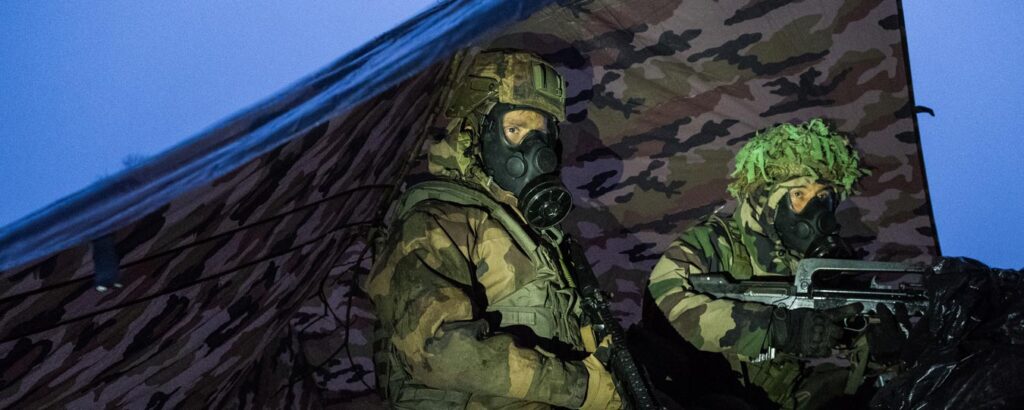The CBD SBIR Program fuels small business innovation in defense, while Team 80 handles DCAA-compliant accounting so you can focus on breaking barriers.
Key Takeaways:
- The CBD SBIR program empowers small businesses to develop chemical and biological defense technologies with substantial funding through a phased approach.
- Eligibility includes being a U.S.-owned for-profit business with fewer than 500 employees, similar to other SBIR programs, but with a specific focus on defense technologies.
- Phase I awards are up to $150,000 for 6 months, while Phase II awards provide up to $1 million over two years, supporting deeper research and prototype development.
- DCAA-compliant accounting is critical for staying on track with government audits, which require precise cost allocation, timekeeping, and adherence to Cost Accounting Standards (CAS).
- Team 80’s experts can handle the complexities of DCAA-compliant accounting, allowing small businesses to focus on innovation and research rather than administrative burdens.
In the race to develop global solutions for chemical and biological defense, small businesses can have a surprising impact—if given the chance.
The Office for Chemical and Biological Defense (CBD) Small Business Innovation Research (SBIR) program opens this window of opportunity, extending a springboard for entrepreneurs to receive the funding needed to enter the world stage.
This blog covers everything from exploring the program’s phases to meeting eligibility criteria and staying compliant with DCAA accounting standards.
Table of Contents
What is the Office for Chemical and Biological Defense SBIR program?
What are the objectives of the CBD SBIR program?
What are the eligibility requirements?
How do I apply for an Office for Chemical & Biological Defense SBIR award?
Who are the CBD program contacts?
What are the SBIR Topics for the CBD?
Who has won a CBD SBIR Phase II award?
What is the Office for Chemical and Biological Defense SBIR program?
The Office for Chemical and Biological Defense (CBD) SBIR program advances technologies that safeguard U.S. forces from chemical and biological threats. This program allows small businesses to contribute innovative solutions in chemical and biological protection, detection, and decontamination. Through a phased approach, small businesses can secure funding for research and development, helping to bring groundbreaking defense technologies to fruition while fostering commercialization potential.
What federal agency is the CBD a part of?
The CBD was initiated by the Department of Defense (DoD) in 1994. Its mission is to equip U.S. military forces with advanced defense capabilities for operating in environments where chemical and biological threats are present. The CBD SBIR program is one of several specialized components within the DoD aimed at addressing these challenges.
A quick note of distinction: The CBD is often mistakenly linked with the Defense Threat Reduction Agency (DTRA), but these are distinct entities. Both play indispensable roles in national defense, with the CBD focusing exclusively on chemical and biological defense technologies and DTRA tackling threats related to weapons of mass destruction. Each program operates independently with its own funding and management structures.
What are the objectives of the CBD SBIR program?
At its core, the CBD SBIR program is about closing the gaps in chemical and biological defense. The program not only advances technologies that directly support military missions, but also encourages solutions with strong potential for commercialization in civilian markets. By partnering with small businesses, the Department of Defense is looking to develop innovative tools that can protect against chemical and biological threats and transition into practical, real-world applications through the Joint Program Executive Office for Chemical and Biological Defense (JPEO-CBD).
As the audit progressed, it became clear that some labor costs, which had been billed to the government, were not properly documented. The contractor had failed to separate direct and indirect costs accurately. What followed was a cascade of disallowed costs—money the contractor had already spent but couldn’t recover because it wasn’t recorded according to DCAA standards. The financial implications were significant, affecting overall cost management and creating unforeseen budgetary challenges, even though the profit percentage remained fixed.
Targeted areas of research and development include:
- Detection and Identification: Creating methods for spotting chemical and biological agents across different environments.
- Protection: Developing passive and active defense systems, from personal protective equipment to full-scale systems that deter threats.
- Decontamination: Introducing novel solutions for neutralizing hazardous materials in military and civilian contexts.
- Medical Technologies: Innovating new treatments and vaccines to protect against and mitigate the effects of chemical or biological exposure.
- Diagnostics and Disease Surveillance: Strengthening the ability to detect and monitor disease outbreaks and potential biological threats.
- Information Systems: Enhancing digital tools for real-time threat analysis and operational decision-making.
These efforts collectively aim to provide comprehensive protection against chemical and biological hazards for the military and, through commercialization, broader civilian applications.
What are the eligibility requirements?
To qualify for the CBD SBIR program, businesses must meet the same criteria set for other SBIR programs by the U.S. Small Business Administration (SBA). Specifically, a business must:
- Be a for-profit entity with 500 or fewer employees.
- Have its primary business operations in the United States.
- Enlist a principal investigator who spends at least 50 percent of their time employed by the small business.
Additionally, only U.S.-owned and operated small businesses can participate. Foreign firms or partnerships with foreign entities are not eligible, maintaining a strict U.S.-centric approach to R&D.
While these eligibility requirements are similar to those found in other federal SBIR programs, the CBD SBIR focuses specifically on technologies relevant to chemical and biological defense. Proposals must address these unique military needs to be considered.
CBD SBIR Phase I
Phase I is the initial stage where small businesses can demonstrate the feasibility of their proposed solutions to address chemical and biological defense needs.
How much is the SBIR Phase I award?
The maximum dollar value for a Phase I award is $150,000, covering up to 6 months of work. It’s important to note that the CBD program no longer includes an option period as part of Phase I projects.
How long is SBIR Phase I?
Phase I typically lasts 6 months. During this time, businesses are encouraged to focus on proving the feasibility of their concept before moving forward.
What are the success rates for SBIR Phase I?
Approximately 10 percent of Phase I proposals are selected for a contract award, with around two proposals chosen for each topic. This competitive process highlights the importance of aligning solutions with the Department of Defense’s key objectives.

CBD SBIR Phase II
Phase II continues the development work started in Phase I, advancing successful projects toward a functional prototype that meets the needs of the CBD and the Department of Defense.
How much is the SBIR Phase II award?
The total available funding for a Phase II award is $1 million, spread over a two-year period.
How long is SBIR Phase II?
Phase II typically spans two years, providing the necessary time for deeper research and prototype development.
What are the success rates for SBIR Phase II?
Approximately 50 percent of Phase I awardees secure a Phase II contract, reflecting the program’s emphasis on advancing promising technologies.

How do I apply for an Office for Chemical & Biological Defense SBIR award?
To apply for a CBD SBIR award, you must submit your proposal through the Defense SBIR/STTR Innovation Portal (DSIP). This portal is the designated submission platform for all DoD SBIR proposals, including those related to the Chemical and Biological Defense program.
Applicants are required to submit their proposals in response to the specific Broad Agency Announcements (BAAs) or Commercial Solution Openings (CSOs) for each fiscal year. These announcements outline the key topics, proposal requirements, and deadlines.
Application Process
- Review the BAA/CSO: Begin by reviewing the relevant BAA or CSO to understand the specific research topics and requirements. This document will outline the necessary proposal structure, cost limitations, and other submission guidelines.
- Submit via DSIP: Proposals must be submitted electronically through the DSIP. Any proposals sent via other means, such as email, will not be considered. The DSIP also offers resources, videos, and support to guide applicants through the process
What is the evaluation process?
The evaluation of your proposal is based on several factors:
- Technical Merit and Innovation: The soundness of your approach and the incremental progress your proposal offers in addressing the topic.
- Qualifications of the Team: Reviewers assess the qualifications of the principal investigators and supporting staff, focusing not only on research capabilities but also on commercialization potential.
- Commercialization Potential: The likelihood that the proposed solution can be commercialized for government or private sector use.
After submission, the evaluation is typically completed within 90 days, and successful applicants are notified. If selected, contract negotiations begin shortly after.
Who are the CBD program contacts?
For inquiries related to the CBD SBIR program, the primary point of contact is:
Abigail Roots
CBD SBIR/STTR Program Manager
Email: abigail.l.roots.civ@mail.mil
What are the SBIR Topics for the CBD?
Currently, there are two open SBIR 2024-25 topics for the CBD program, both focused on advancing solutions in chemical and biological threat detection and treatment.
1. Host Directed Therapeutics for Viral Disease Treatment
- Submission Dates: Open – 08/22/2024 | Close – 09/24/2024
- Objective: Develop broad-acting host-directed therapeutics to treat or prevent viral diseases. These therapies target human host factors required for viral replication, potentially providing a more resilient defense than direct-acting antivirals.
- Key Focus: The development of therapies effective against multiple viral families, including Filoviruses and Poxviruses, to address gaps in current antiviral treatments.
- Phase I: Focuses on identifying and testing compounds that inhibit virus replication in laboratory settings, using both live viruses and surrogate assays.
- Phase II: Further refines the most promising compounds, optimizing them for preclinical testing and assessing their effectiveness against a range of viral strains.
2. Quantum Chemical Sensing
- Submission Dates: Open – 08/22/2024 | Close – 09/24/2024
- Objective: Create quantum sensors capable of detecting highly sensitive and specific chemical threats. These sensors leverage quantum behaviors like superposition and entanglement to improve detection accuracy at lower concentrations.
- Key Focus: The miniaturization of devices and overcoming integration challenges with existing technologies to develop a functional prototype capable of detecting hazardous chemicals.
- Phase I: Involves evaluating the feasibility of a quantum sensor for detecting chemical threats, focusing on enhancing signal accuracy and miniaturizing the device for practical use.
- Phase II: Develops a working prototype of the quantum sensor, integrating software for threat detection and preparing it for real-world testing.
- Phase III Dual Use Applications: Focuses on refining the deployable equipment and seeing that it meets operational requirements. The technology developed here could transition into various civilian applications beyond detecting explosives, such as drug analysis, medical imaging, food safety, environmental monitoring, and material analysis.
Who has won a CBD SBIR Phase II award?
The CBD SBIR program has paved the way for several groundbreaking innovations, allowing small businesses to develop critical technologies that address chemical and biological threats. Below are some standout Phase II success stories:
Here are three success stories from recent awardees:
Company: CFD Research Corporation
Phase II Award Amount: $548,493

Antivirals Against Bunyavirus
CFD Research Corporation, based in Huntsville, Alabama, is advancing an innovative broad-spectrum antiviral drug targeting bunyaviruses—viruses with a high potential to cause future pandemics. Their natural product-derived antiviral has shown strong in vitro potency and minimal cytotoxicity, making it a promising candidate for therapeutic use.
With a $548,493 Phase II award, CFD Research is working to optimize their lead compound to combat this significant viral threat. This project is poised to close the gaps in current treatments for viral families like filoviruses and poxviruses. The future of pandemic preparedness could very well hinge on the success of these efforts.
Company: Novateur Research Solutions
Phase II Award Amount: $549,984

Multi-Modal Chemical Threat Detection
Hailing from Ashburn, Virginia, Novateur Research Solutions is leveraging deep learning technology to detect chemical threats using multiple sensor data streams. Their Phase II project, awarded $549,984, focuses on developing a real-time detection system that fuses imaging and chemical sensors. With capabilities that extend to unknown environments and unpredictable conditions, Novateur is at the forefront of chemical threat detection technology.
Their project also benefits from extensive research into deep learning, robotics, and sensor fusion, aiming to create a deployable system that can operate efficiently in various scenarios, including those involving CBRNE (Chemical, Biological, Radiological, Nuclear, and Explosives) threats.
Company: Critical Innovations LLC
Phase II Award Amount: $275,581

Combat Foam for Sulfur Mustard Injuries
Located in Lawndale, California, Critical Innovations is tackling a serious medical need: treating injuries caused by sulfur mustard, a chemical warfare agent. With a $275,581 Phase II award, they are developing Succor, a combat foam designed to treat dermal injuries more effectively than traditional dressings.
Collaborating with top medical and research experts, Critical Innovations is advancing this innovative product through pilot production and live-animal testing to prove its stability and readiness for combat environments. The ultimate goal is to ensure this foam meets all regulatory requirements, clearing the path for its use on the battlefield.
CBD SBIR Accounting Requirements
Participating in the CBD SBIR program requires strict adherence to Defense Contract Audit Agency (DCAA) accounting standards. Below are the key accounting areas small businesses must address when applying for and managing a CBD SBIR award.
DCAA Accounting Requirements
DCAA accounting guidelines maintain transparency and accuracy in how businesses allocate costs and track time spent on government-funded projects. DCAA audits are used to verify that businesses are using proper financial controls. Failure to comply can lead to disqualification from future contracts or delayed payments.
Cost Allocation
Cost allocation refers to the method by which costs are distributed across different projects and categories. For the CBD SBIR program, you must classify all direct and indirect costs properly:
- Direct Costs: These include expenses directly tied to the SBIR project, such as salaries for personnel working on the project, materials, and equipment.
- Indirect Costs: These cover overhead expenses like administrative support or facilities costs, which are shared across multiple projects. Indirect costs are allocated based on a reasonable and consistent methodology, often using ratios such as labor hours or square footage.
Misallocation, such as assigning personal or non-project-related expenses to the SBIR project, can result in non-compliance and may trigger an audit.
Timekeeping
Under DCAA compliance, every hour of work performed on the SBIR project must be accurately recorded and attributed to the correct contract:
- Daily Logs: Employees must maintain daily logs that reflect the exact hours worked on the SBIR project. These records should be contemporaneous, meaning they are updated in real-time or soon after the work is performed.
- Charge Codes: Each contract should have its own charge code to differentiate between work performed for different clients or projects. Employees must use the correct charge code when entering hours worked on the CBD SBIR project.
- Audit Trails: The timekeeping system must provide an audit trail that allows auditors to track any changes to time entries.
DCAA audits frequently focus on timekeeping systems, and failure to maintain accurate time records can lead to penalties or repayment of funds.
Cost Accounting Standards (CAS)
Cost Accounting Standards (CAS) apply to SBIR contracts over a certain threshold and help standardize the way costs are measured, assigned, and allocated. The goal is to promote consistency and fairness in cost allocation across all contracts:
- Consistency: CAS requires that all costs, whether direct or indirect, are treated consistently across all government contracts.
- Disclosure Statement: Businesses subject to CAS must submit a detailed disclosure statement explaining their cost accounting practices. This document is reviewed by the DCAA to verify compliance.
- Cost Measurement: CAS governs how different types of costs are measured and ensures that the same methods are used throughout the contract period. For instance, if you categorize travel expenses as indirect costs in one contract, you must do so across all contracts unless there is a significant reason to change the classification.
Improper cost accounting can result in audit issues, contract disputes, or financial penalties.
Why DCAA-Compliant Accounting is Crucial for CBD SBIR
DCAA-compliant accounting is no mere formality. It keeps your CBD SBIR project on track and in good standing with government auditors. Precise cost tracking, accurate timekeeping, and consistent cost allocation are mandatory to avoid disruptions and missed opportunities. Without proper accounting practices, your project’s progress—and future contracts—could be jeopardized.
Team 80 understands the complexity of DCAA regulations and offers specialized support so that your business can concentrate on innovation, not paperwork. We handle:
- Cost Allocation: Accurately tracking every expense, both direct and indirect, to keep your project financially sound.
- Timekeeping: Implementing systems that log every hour worked in real-time, ensuring flawless audits.
- CAS Compliance: Guiding you through cost measurement and reporting so your contracts meet the strictest standards.
With Team 80 managing the financial details, you can fully dedicate yourself to research and development, knowing your accounting is handled by experts who understand the stakes.
Need help navigating CBD SBIR accounting?

Katie Laureano
Team 80 COO
Katie has a gift for helping new clients feel comfortable working with Team 80. She is thorough, striving to understand each client’s unique needs deeply. Using her extensive experience working as an accountant, she can develop an accounting system that will give business owners an understanding of the financial aspects of their company. There is nothing like a concert to get Katie’s blood pumping; music is a big part of her life. You can find her on the water paddle boarding, a boat wake surfing, or snowboarding slopes when she’s not serving our wonderful clients.
